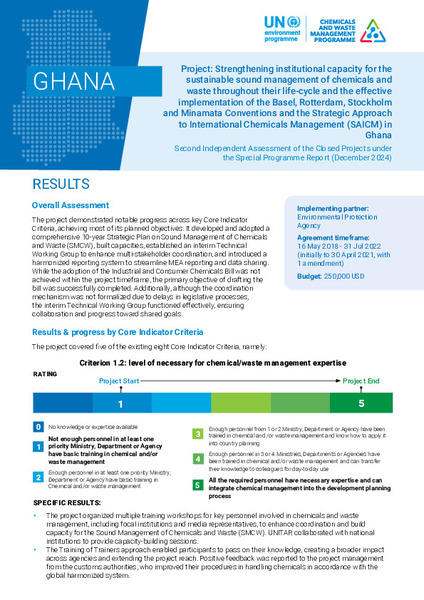Ghana - Project: Strengthening institutional capacity for the sustainable sound management of chemicals and waste throughout their life-cycle and the effective implementation of the Basel, Rotterdam, Stockholm and Minamata Conventions and the Strategic Approach to International Chemicals Management (SAICM) in Ghana - Second Independent Assessment of the Closed Projects under the Special Programme Report (December 2024)

Date
2024-12Author
United Nations Environment Programme
Citation Tool
Bibliographic Managers
RT Generic T1 Ghana - Project: Strengthening institutional capacity for the sustainable sound management of chemicals and waste throughout their life-cycle and the effective implementation of the Basel, Rotterdam, Stockholm and Minamata Conventions and the Strategic Approach to International Chemicals Management (SAICM) in Ghana - Second Independent Assessment of the Closed Projects under the Special Programme Report (December 2024) A1 United Nations Environment Programme YR 2024-12 LK https://wedocs.unep.org/20.500.11822/47414 PB AB TY - GEN T1 - Ghana - Project: Strengthening institutional capacity for the sustainable sound management of chemicals and waste throughout their life-cycle and the effective implementation of the Basel, Rotterdam, Stockholm and Minamata Conventions and the Strategic Approach to International Chemicals Management (SAICM) in Ghana - Second Independent Assessment of the Closed Projects under the Special Programme Report (December 2024) AU - United Nations Environment Programme Y1 - 2024-12 UR - https://wedocs.unep.org/20.500.11822/47414 PB - AB - @misc{20.500.11822_47414 author = {United Nations Environment Programme}, title = {Ghana - Project: Strengthening institutional capacity for the sustainable sound management of chemicals and waste throughout their life-cycle and the effective implementation of the Basel, Rotterdam, Stockholm and Minamata Conventions and the Strategic Approach to International Chemicals Management (SAICM) in Ghana - Second Independent Assessment of the Closed Projects under the Special Programme Report (December 2024)}, year = {2024-12}, abstract = {}, url = {https://wedocs.unep.org/20.500.11822/47414} } @misc{20.500.11822_47414 author = {United Nations Environment Programme}, title = {Ghana - Project: Strengthening institutional capacity for the sustainable sound management of chemicals and waste throughout their life-cycle and the effective implementation of the Basel, Rotterdam, Stockholm and Minamata Conventions and the Strategic Approach to International Chemicals Management (SAICM) in Ghana - Second Independent Assessment of the Closed Projects under the Special Programme Report (December 2024)}, year = {2024-12}, abstract = {}, url = {https://wedocs.unep.org/20.500.11822/47414} } TY - GEN T1 - Ghana - Project: Strengthening institutional capacity for the sustainable sound management of chemicals and waste throughout their life-cycle and the effective implementation of the Basel, Rotterdam, Stockholm and Minamata Conventions and the Strategic Approach to International Chemicals Management (SAICM) in Ghana - Second Independent Assessment of the Closed Projects under the Special Programme Report (December 2024) AU - United Nations Environment Programme UR - https://wedocs.unep.org/20.500.11822/47414 PB - AB -View/Open
Item Statistics
Display item statisticsMetadata
Show full item recordDescription
The project demonstrated notable progress across key Core Indicator Criteria, achieving most of its planned objectives. It developed and adopted a comprehensive 10-year Strategic Plan on Sound Management of Chemicals and Waste (SMCW), built capacities, established an interim Technical Working Group to enhance multi-stakeholder coordination, and introduced a
harmonized reporting system to streamline MEA reporting and data sharing. While the adoption of the Industrial and Consumer Chemicals Bill was not achieved within the project timeframe, the primary objective of drafting the bill was successfully completed. Additionally, although the coordination mechanism was not formalized due to delays in legislative processes,
the interim Technical Working Group functioned effectively, ensuring collaboration and progress toward shared goals.
Collections
Document Viewer
To read more, scroll down below.

